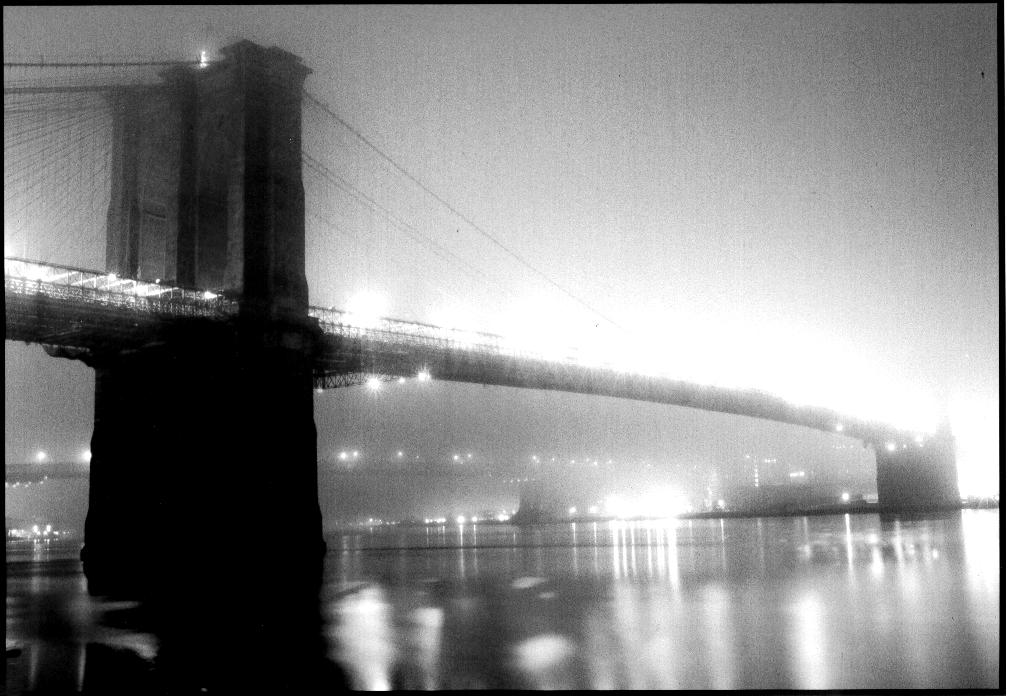nycBigCityLit.com the rivers of it, abridged


Big City, Little
Spring 2010
Big City, Lit
Nicholas Johnson
Photo: George Kunze
It's more than a long, dark road. You're in your car, with everything you need in the glove box, back seat, trunk. You've got your smoke, there's the fog, and some rain, and more fog, and thoughts of searchlights.
Maybe there's someone beside you—or there will be—for who knows for how long. A guy thing maybe: a city, a woman, warm coffee, more smokes.
Stations drift in and out in the sing-along tease 'til you've had enough of the night, the absolute black Van Gogh claimed didn't exist. All the tricks, like in a Dylan song, play by the roadside shoulders.
It's what you want: not exactly lost, not exactly knowing where you are, but full of the importance of being elsewhere, speeding toward.
And so you drive on, grateful for the dashboard, steering wheel in your hands, strings of mileposts, tiny reflectors, what's left of the white lines, rarities the more traveled, rained on.
Smoke, fog, smudge of light on the horizon: The City, allegory-big. You on the way, bridge-buzzed, highway-wired, everything within reach, toward the light, the place where "symbol is the thing itself."
Nicholas Johnson is co-founder and editor of the magazine. His new chapbook, Degrees of Freedom, is now available from Bright Hill Press.
Jared Smith
Having Almost Forgotten Why I Was Here
I stand flat against window glass in Manhattan,
pressing my palm against the cold winter of evening.
The lights are out. The bellman rings and slips an envelope
under the door. The plastic in my pocket is fulfilled.
The closet is empty now, but for an unused bathrobe.
Shampoo bottles oddly bright with infused light by the bath.
My forehead leaves a smudge of DNA against the night,
and as moments pass I push my hips too against the glass.
With a luck of sorts I will fall into what surrounds me now
and my past will meet me in the eyes of a coyote pausing
on the moonlit night ice of Central Park with no entity.
Kristen Spears
City to a Small Person
Trees in the dark park are still visible
outlined by industrial port lights in 'Jersey
and moon dappled waves on the Hudson.
Some days the buildings feel homey
and of the correct proportion
with a bright sky beyond the gray.
But, during the off moments
of more cloudy times
buildings have no end,
there is no sky
and this metropolis cages.
Steel and alloy needles press into fog,
press into clouds and draw dew drops,
rain drops, snow to street level.
Delicate this all feels,
a piece of re-bar bent and it may all implode,
a window shattered and this dream collapsed.
Perhaps, though, this is just my fragile mind
and soft body cocooned in this glassy place.
Lori Desrosiers
Hudson
My river, you run brimming
with barges tugboats, trout.
Flanked by Catskills and Palisades,
your source is Lake Tear of the Clouds,
Adirondack mountain stream.
Your Mohican name is Muh-he-kun-ne-tuk.
Trout breech into ever
widening circles. Heron and egret
wade in the shallows, eagerly fishing.
At sunset, bats rush from shoreline caves
catching mosquitoes in mid-air.
Ancient oak trees lean,
gesticulating toward the opposite bank,
their roots touching the shallows.
The shadows of great bridges,
George Washington, Tappan Zee,
ripple your waves on a windy day.
Robert Klein Engler
The Invitation
Men of God tell us the great pain of Hell
is the pain of separation. Sublunary lovers
know this already, or something like it
in the faint colors of everyday longing.
This morning the sun is quarterway towards
noon and pushes ahead a cerulean blue
sky with a hint of autumn in the air among
turning leaves. The color of longing is rust.
We hear when Jesus walked in Bethlehem
some had their longing cured. Others
dragged out Scripture to argue over words.
The color of longing is rust and blood.
Now, the field corn is stripped and ground.
Now, the water blushes into wine.
The saints take up their cross. It grows cold.
The colors are rust and blood and gold.
